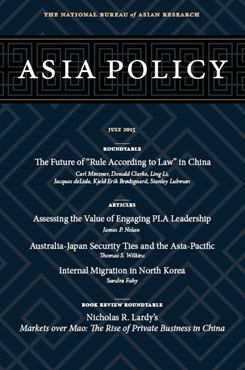Conclusion
Stronger and More Professional Courts—But Still Under Party Control
This essay is part of the roundtable “The Future of ‘Rule According to Law’ in China.”
Stanley Lubman is a Senior Fellow with the Honorable G. William and Ariadna Miller Institute for Global Challenges and the Law and Distinguished Lecturer in Residence (retired) in the Berkeley Law School at the University of California.
Since Xi Jinping became president of the People’s Republic of China (PRC) in 2013, the Chinese Communist Party (CCP) has been energetically promoting law reform, which has been on an uncertain path since the 1980s. The current structure and policies of the party-state present several formidable obstacles to the progress of law reform on that path:
- The CCP’s determination to maintain its firm hold on Chinese society, as evidenced in its treatment of law as subservient to policy, politicized control of the courts, and repression of speech and action regarded as expressing dissent
- The fragmented authoritarianism of the current political system, often manifested in local governments’ deviation from policies and laws issued from Beijing
- The influence and impact of Western institutions, as reflected in demands for an enforceable constitution, expanded judicial power to limit the authority of government agencies, and greater transparency of these agencies
The five roundtable essays focus principally on the reforms declared in the decision issued at the conclusion of the Fourth Plenum of the Central Committee of the Communist Party of China in October 2014. As Kjeld Eric Brødsgaard points out in his essay, the Central Committee addressed law reform in the fourth meeting even though “party building” would have been next in the customary sequence. The proposed reforms articulate conceptions of the rule of law and the relationship between the party and the operation of the political-legal system (as the courts, procuratorates, and police are commonly referred to because of the closeness with which they operate). In considering these reforms, the roundtable essays raise an issue that has been crucial since the PRC was established in 1949—the uneasy tension between central control over the Chinese bureaucracy and the operation of local governments. Close attention is devoted to how yifa zhiguo, commonly translated as rule by law, is applied and interpreted in the authoritarian governance of China today. In criminal cases, the courts cooperate with the police and procuracy rather than acting independently, and they are subject to the supreme authority of the party leaders whenever those officials view any issue as touching on party dominance. The essays share a common approach in discussing specific reforms in the operation of the courts, namely recognition that in practice implementation must be carried out within limits imposed by party rule.
Decision-making within the courts is structured to support the superiority of party policies and concerns. A prime example is party sensitivity to actions and speeches that are deemed to threaten social stability. Among the concerns that overshadow more than just the work of the courts is strong opposition to the expression of Western values in discussions of law outside the courts, including educational institutions.
About Asia Policy
Asia Policy is a peer-reviewed scholarly journal presenting policy-relevant academic research on the Asia-Pacific that draws clear and concise conclusions useful to today’s policymakers. Asia Policy is published quarterly in January, April, July, and October and accepts submissions on a rolling basis. Learn more


